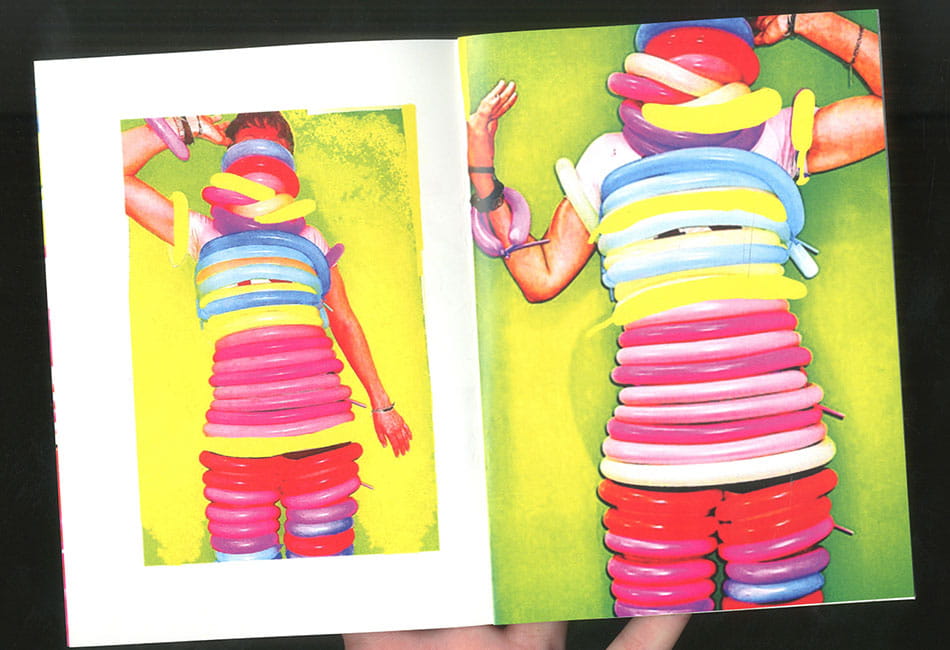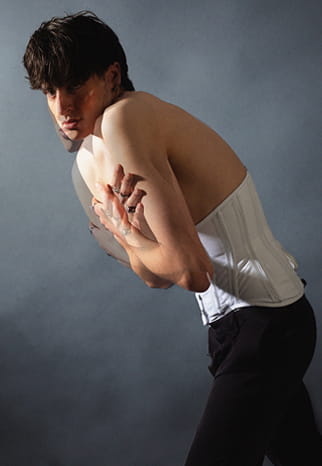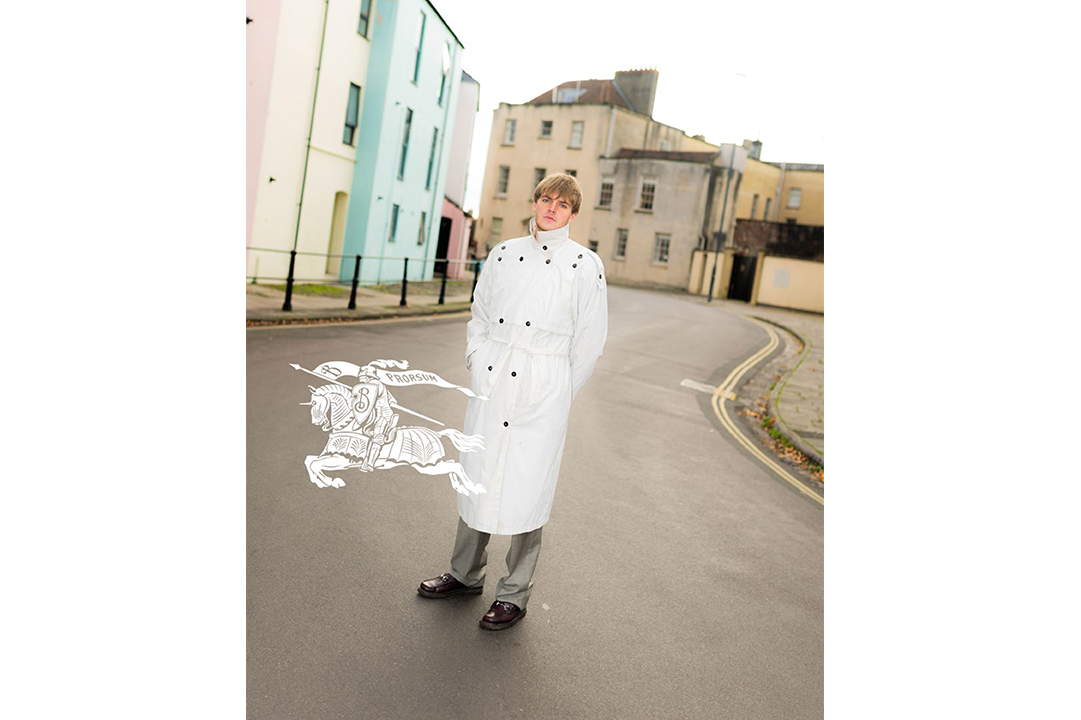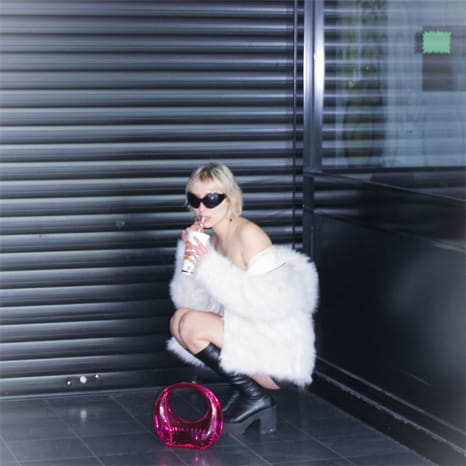
BA(Hons) Fashion Communication
This course is open for applications
About
BA(Hons) Fashion Communication is a practice-led course developed to reflect the dynamic and fast changing pace of this exciting industry. Its interdisciplinary structure enables you to create engaging fashion stories and effective brand campaigns through a diverse range of media.
Why study fashion communication?
The fashion industry supports 1.3 million jobs in the UK and communication is a key part of this business. The industry is seeking emerging talent with a clear understanding of contemporary culture and fashion, and experience in creative problem-solving skills.
Our Fashion Communication course builds transferable skills through live briefs and professional practice, focusing on employability throughout.
You'll research brands, trends and consumer behaviour, then develop strategies and creative campaigns across branding, styling, storytelling, still and moving imagemaking, art direction, graphics, marketing, traditional print and digital platforms.
You'll gain software and immersivetech skills while developing ethical, inclusive approaches and critically exploring the role of AI (Artificial Intelligence) in contemporary communication.
Why UWE Bristol?
BA(Hons) Fashion Communication will provide you with all the key skills required by employers to create content and communicate effectively through a variety of digital and print platforms.
Based at the Arnolfini, in the heart of Bristol, you'll be part of a tight knit community of expert staff, many of whom are fashion communication practitioners, alumni and visiting lecturers from the industry.
Our students produce ambitious and innovative portfolios and many have won, or been shortlisted, for Graduate Fashion Week awards. We're a member of the Graduate Fashion Foundation, which offers the chance to showcase work nationally and internationally.
Where can it take me?
As a Fashion Communication graduate, you'll be equipped with the hands-on skills and real-world experience you need to kick start your professional career in the industry.
Previous graduates are now working as fashion editors, creative directors, art directors, content producers, social media/influencer marketing managers, PR executives, photographers, videographers, stylists, trend forecasters and visual merchandisers.
Our alumni have worked with brands such as JW Anderson, Burberry, Selfridges, BBC, DAZED, Loewe, ModusBPCM, Mytheresa, Purple Mountain Observatory, Ralph Lauren, Stylist, and YOOX Net-A-Porter.
Explore our Fashion Communication students work in our Showcase 2025.
Student showcase
Watch: Welcome to the School of Arts at UWE Bristol
Entry
Typical offers
You will need to meet the following Level 2 requirements:
- GCSE: Grade C/4 in English, or equivalent.
In addition to the above Level 2 qualifications, you'll need to achieve the published tariff points from your Level 3 studies prior to entry. Below is an indicative list of the main qualification types. However, we will consider any Level 3 qualifications towards meeting our entry requirements.
- Tariff points: 112
- Contextual tariff: See our contextual offers page.
- English Language Requirement:
International and EU applicants are required to have a minimum overall IELTS (Academic) score of 6.0 with 5.5 in each component (or approved equivalent*).
*The University accepts a large number of UK and international qualifications in place of IELTS. You can find details of acceptable tests and the required grades you will need in our English language section. Please visit English language requirements.
- A-level subjects: No specific subjects required.
- EDEXCEL (BTEC) Diploma: No specific subjects required. For information on required Guided Learning Hours please see our minimum entry requirements page.
- Access: No specific subjects required.
- Baccalaureate IB: No specific subjects required. We accept the IB Career-related Programme in conjunction with other Level 3 qualifications.
- Irish Highers: No specific subjects required.
- Welsh Baccalaureate: We accept tariff points achieved from the Advanced Skills Baccalaureate Wales in conjunction with other Level 3 qualifications.
- Cambridge Technical: No specific subjects required.
- T Levels: No specific subjects required.
Selection process
Following our review of your application, if you're not studying a related subject, we may request that you provide us with a digital portfolio.
If you are asked to provide a digital portfolio, you may also be invited for an online interview, if we have any questions about your portfolio.
A decision will then be made on the basis of both your application and our review of your portfolio.
For more details on the process, please visit our selection page.
Entry requirements
If you don't meet the entry requirements, you may be eligible for BA(Hons) Fashion Communication (with Foundation Year).
International applicants
If you're applying to UWE Bristol from another country or region, visit international study for tailored application information.
If you're an international student and don't meet the academic requirements to study this course, you can qualify by completing one of our Art and Design foundation courses.
If you're applying to study at UWE Bristol and require additional support to meet our English language requirements, you may be able to attend one of our pre-sessional English courses. Read more about our Pre-Sessional English Programme.
Read more about entry requirements.
How to apply
Read more about undergraduate applications.
Read more about international applications and key international deadline dates.
For further information
- Email:
UK applicants
Admissions@uwe.ac.ukInternational/EU applicants
International@uwe.ac.uk - Telephone:
UK applicants
+44 (0)117 32 83333International/EU applicants
+44 (0)117 32 86644
Structure
Content
You'll study:
Design Contexts
This module introduces you to the subject of design and a suite of different cross-discipline design methods, supporting you to think about design holistically and understand its broader remit and application.
Introduction to Fashion Communication
You'll be introduced to and establish your knowledge and understanding of fashion communication through practical and contextual research and development.
Exploring Practice in Fashion Communication
You'll deepen your understanding of fashion communication through practical and contextual research and development. You'll be introduced to publishing for fashion and given the opportunity to develop your own critical perspective on issues and debates surrounding the subject of fashion.
Contextualising Practice in Fashion Communication 1
You'll gain insight into professional contexts within the fashion and creative industries, how they operate and where employment and commercial opportunities exist. You'll develop your knowledge of fashion marketing through a live/industry group project.
You'll study:
Design Futures
You'll develop a future-orientated mindset for design, rooted in an understanding of the evolving and complex nature of global challenges. This module emphasises the role of design in addressing global challenges through interdisciplinary thinking and collaboration.
Developing Practice in Fashion Communication: Exploration
You'll build upon previous learning and develop your skills through projects that will encourage your creative experimentation, allowing you to generate ideas, test concepts and develop these through to outcomes.
Developing Practice in Fashion Communication: Realisation
You'll generate ideas and concepts, building upon your own strengths and ambitions and developing your individual practice through a series of projects set by your tutors.
Contextualising Practice in Fashion Communication 2
You'll further expand your knowledge of professional contexts within the fashion and creative industries, how they operate and where employment and commercial opportunities exist.
You'll study:
Design Research Project
Through the production of work that could take the form of still or moving image, practice, sound or writing, you'll develop your critical and creative thinking skills - connecting practical outcomes to a deeper analytical, theoretical and contextual backdrop.
Self-Directed Study in Fashion Communication: Exploration
You'll have the opportunity to showcase your conceptual, technical and creative skills and align these with your personal and professional ambitions, through creative experimentation, testing and prototyping.
Self-Directed Study in Fashion Communication: Realisation
You'll build upon your proposal developed in the previous module, to deliver a piece of work that showcases creative innovation and aligns with your own personal and professional ambitions.
Contextualising Practice in Fashion Communication 3
You'll identify personal career aspirations and opportunities offered by the fashion and related industries, further developing your self-promotional materials to support progression to employment or further study.
This structure is for full-time students only. Part-time students study the same modules but the delivery pattern will be different.
The University continually enhances our offer by responding to feedback from our students and other stakeholders, ensuring the curriculum is kept up to date and our graduates are equipped with the knowledge and skills they need for the real world. This may result in changes to the course. If changes to your course are approved, we'll inform you.
Learning and Teaching
Develop your professional and creative strengths through practice-led teaching and fast-paced experimental projects. Learn through a mix of taught, independent and collaborative learning, which will expand your understanding of industry roles and workflow process. Lectures, seminars, tutorials, technical, academic and employability workshops, presentations, critiques, and external visits will develop your creative, technical, and critical thinking skills.
Our strong industry links will offer you a range of professional opportunities, such as attending talks from guest speakers. Previous speakers have included representatives from Alexander McQueen, Burberry, Gut Magazine, Twin Magazine, International Magic, Institute of Digital Fashion, Warner Music, CRACK Magazine, Fred Perry and LN-CC.
Highlight your work to talent scouts and potential employers at the Degree Show and via Showcase.
We also take part in national and international exhibitions, such as Graduate Fashion Week.
See our full glossary of learning and teaching terms.
Study time
In a typical week in your first year, you could expect to be timetabled with academic and technical staff for an average of 12 hours, with the expectation that you'll also work on practice and assessment tasks through independent self-study for an additional 12-18 hours.
Assessment
There are no formal exams in this course. Instead, we use a variety of assessments that will enable you to show how you are developing as a creative, professional practitioner as well as a reflective and critical thinker. These may include the creative practice work you make, either individually or in groups, as well as presentations, reports, and written or film essays. These assessments take place at key points in the module. In addition, formative assessment is offered throughout the module to enable you to track your progress and help you develop assessment tasks.
Learn more about assessments.
Fees
Full time course
Part time course
Indicative Additional Costs
Supplementary fee information
Your overall entitlement to funding is based on how long the course is that you're registered on.
Standard funding is allocated based on the standard number of years that your course lasts, plus one additional year.
You'll apply for funding each year that you study and Student Finance will take into account how long the course is in each year that you apply. So if you register for the six year course and then transfer to the three year course, the number of years you can apply for funding will change. Student Finance will reassess your funding based on how many years you have been in study, not just those years for which you received student finance.
Always seek advice before taking any action that may have implications for your funding.
Additional costs
This refers to items you could need during your studies that aren't covered by the standard tuition fee.
These could be materials, textbooks, travel, clothing, software or printing.
Features
Placements
Students who undertake work experience tend to graduate with better degrees. Work experience hones your skills, industry knowledge and professional network, making you a sought-after graduate.
The role of practical experience in the success of our graduates is unquestionable. Past students have worked with iconic brands such as: Gucci, Italian Vogue, London/Paris Fashion Week, Toni & Guy, Moschino, Burberry and Getty Images.
You'll also study modules that include professional practice and work experience, tailored to your career ambitions.
Get help to find your placement and support throughout from college staff and our award-winning careers service.
Study exchange
Grow your personal and professional network, and develop specialist subject knowledge by spending a semester at one of our fantastic partner universities abroad. Explore our study abroad pages to find out more.
Increase your confidence and intercultural communication skills and boost your employability.
Fieldwork
Go behind the scenes of the fashion industry at trips to agencies, factories and events. We also arrange an optional visit to Tokyo, Copenhagen or Stockholm, as well as regular visits to exhibitions in London, where possible.
Study facilities
Fashion Communication is based at Arnolfini contemporary arts centre at City Campus, a creative powerhouse that spans the city of Bristol. Our location connects your teaching and learning with some of the best creative and cultural organisations in Bristol.
Exceptional fashion facilities and resources include industry-standard digital media studios, plus production and fabrication workshops offer a combination of traditional tools and the latest technology.
You'll also study at Bower Ashton, home to the main creative and cultural industries library and support services for students.
In your final year, you'll have evening access to the studios and workshops.
Learn more about UWE Bristol's facilities and resources.
Take a personalised virtual tour of the Fashion facilities and experience what a typical day could look like here for you.
Personalised virtual tour
There's no need to visit us in person to explore our facilities and campuses. Take a personalised virtual tour and discover it all for yourself from wherever you are.
Take a virtual tourCareers
Careers / Further study
Throughout your course, you'll shape your studies towards your chosen career path through your modules and assessments. Study and apply branding, market analysis, content creation and PR to your creative work and investigate digital marketing strategies, future trends and technology's role in fashion.
Discover approaches towards communicating and promoting fashion and apply new ideas through developing projects, such as zine making, digital marketing campaigns, content creation and promotional films. In your final year, you'll have the chance to demonstrate your creativity and fashion knowledge through an extended independent project using a platform of your choice.
Focusing on the avenues that most interest you, you'll graduate with an impressive portfolio of work and skills, ready to take your place in the fashion industry. From the outset, you'll develop strong research skills to help you engage with contemporary and historical debates in fashion communication. Working with practitioners on live projects provides a unique opportunity for you to gain enterprise skills for your cv.
You'll also hone your soft skills, such as interpersonal skills, teamwork, organisational skills and student conduct. We'll encourage you to use these skills to share your work online and offline throughout the course. We update the course's Instagram regularly with student work.
As a fashion communication graduate, you could go into a variety of roles across the industry. These include art direction, fashion film, digital and social media, advertising, PR and marketing, copywriting, photography, event management, styling and more.
Past graduates have gone on to work in various positions at companies such as: Burberry, Gucci, Levi's, Garage Magazine, Getty Images, Stella McCartney, Disney, adidas, Vice, Oxfam, ASOS, Nike, Monsoon, Accessorize, LUSH Cosmetics, COS, Pandora Jewellery, Universal Music, Sony Music Entertainment, Ted Baker, Urban Outfitters and Superdry.
Get inspired
Our award-winning careers service will develop your employment potential through career coaching and find you graduate jobs, placements and global opportunities.
We can also help find local volunteering and community opportunities, provide support for entrepreneurial activity and get you access to employer events.
Visit our employability pages to learn more about careers, employers and what our students are doing six months after graduating.
Life

Accommodation
An excellent range of options for all of the Bristol campuses and the city centre.

Bristol
A stunning city for student living with all the qualities to make you want to stay.

Sports, societies and activities
There is more to your experience here than study. Choose to make the most of it and try new things.

Health and Wellbeing
We provide support in the way you need it.

Campus and facilities
Discover our campuses and the wealth of facilities provided for our students.



